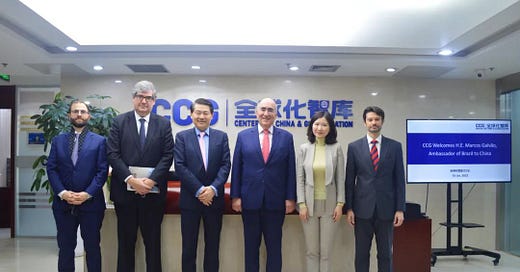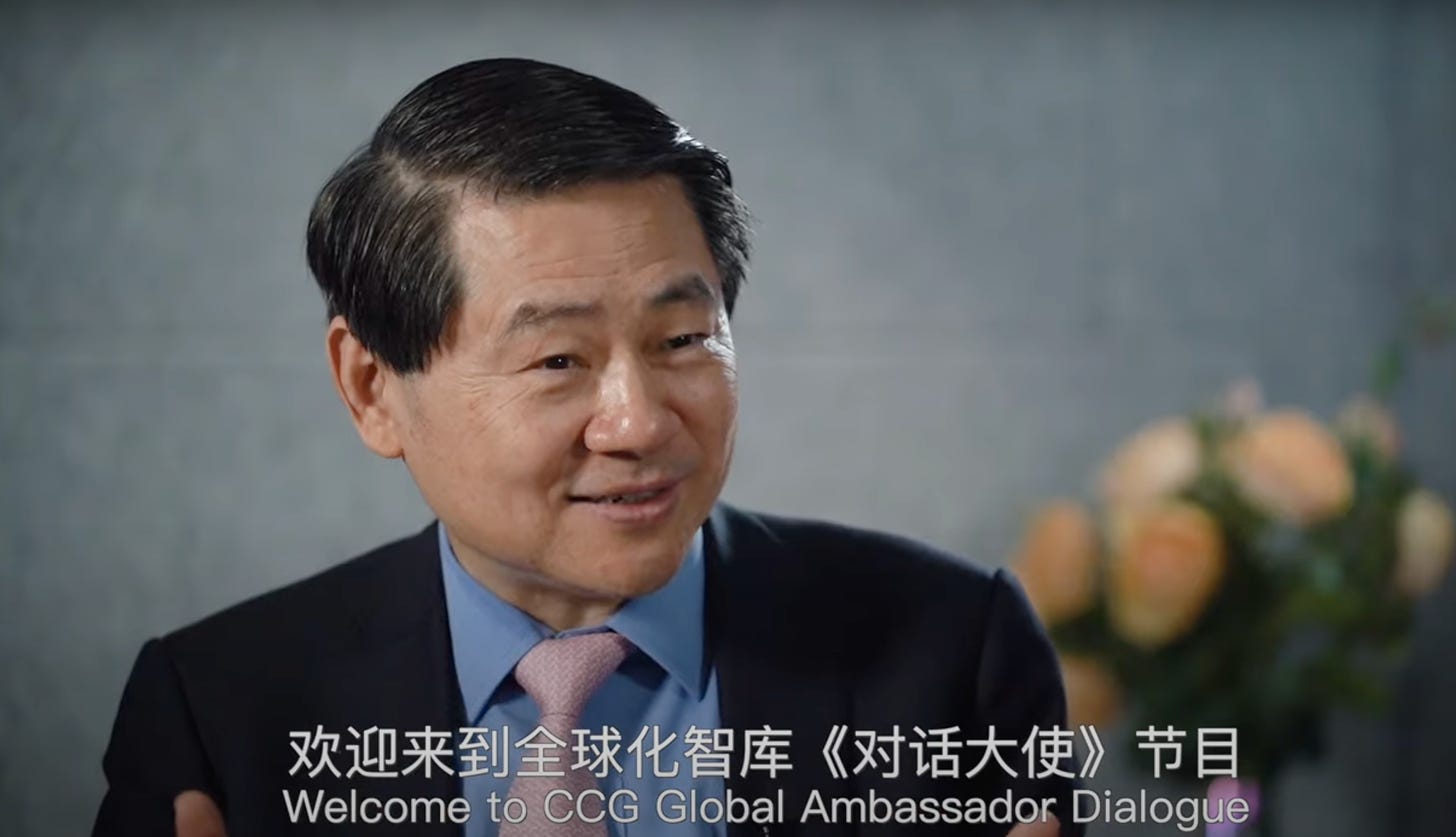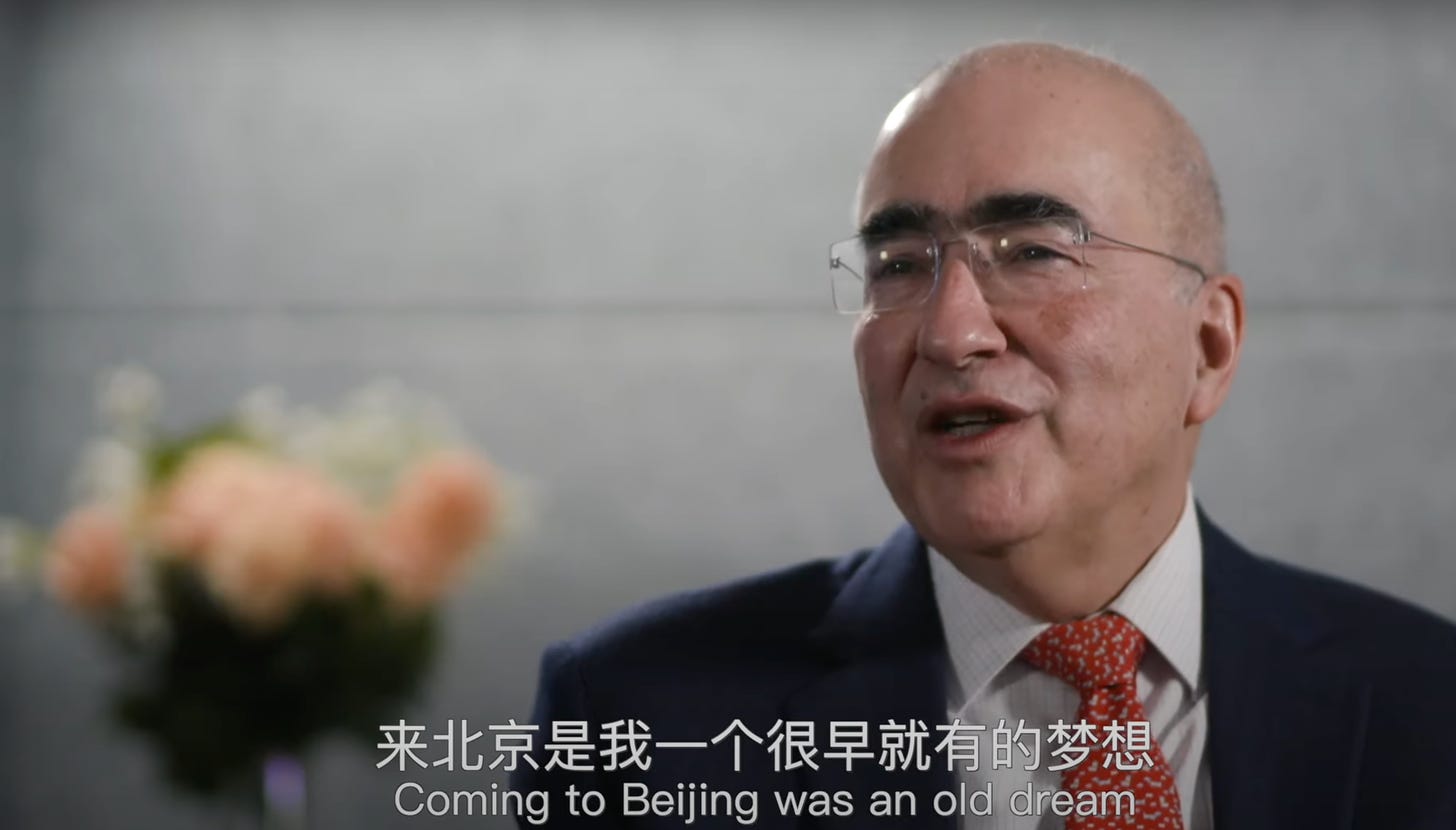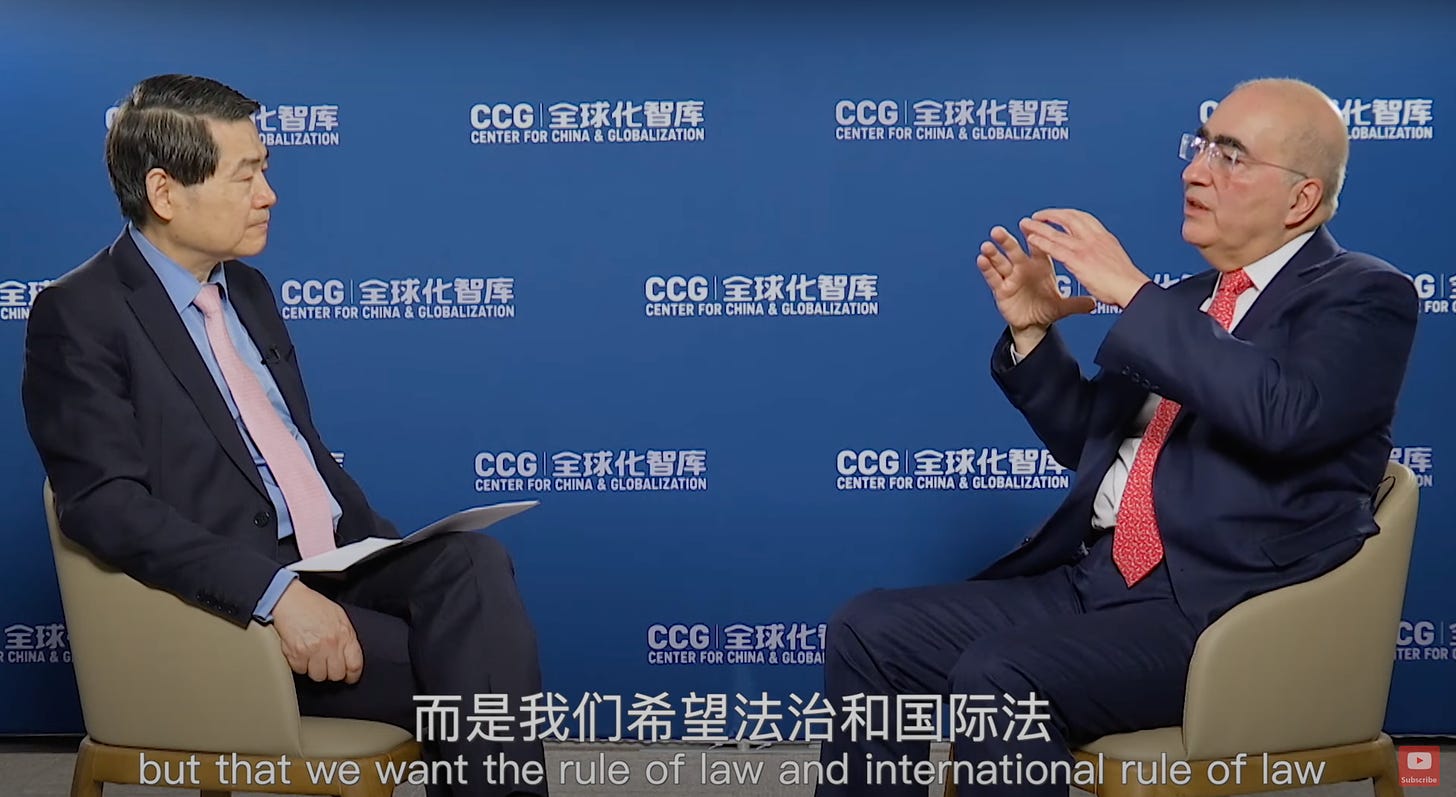Transcript: Brazilian ambassador to China Marcos Galvão in dialogue with Wang Huiyao
Galvão joined CCG president Wang Huiyao for a dialogue on the bilateral relations: never a breach of trust between Brazil and China
As part of a visit to CCG by delegates from the Brazilian Embassy to China, Ambassador Marcos Galvão sat down with Wang Huiyao in the first episode of the CCG Ambassador Dialogue Series. Ambassador Galvão expressed hopes for China-Brazilian relations in the upcoming year and discussed opportunities for the bilateral relationship under President Lula’s new leadership. Below is the video of their conversation and a transcript. It is produced and edited by CCG staff and has not been reviewed by the speakers of this conversation.
Transcript
(preview) Marcos Galvão: One element of our relations with China, I think, over these years, over almost half a century, is that there has never been a breach of trust among ourselves.
President Lula was elected. He has become in a way the Pelé of Brazilian politics. He has also become the face of Brazil.
Wang Huiyao: So Good morning, Ambassador Marcos Galvão, your excellency. Welcome to CCG Global AmbassadorDialogue. I know that you just assumed your post in China in August, a few months ago. What's your impression so far? I know that the COVID (restriction) is getting lifted these few days. So you are coming at the right time.
Marcos Galvão: Thank you very much Dr. Wang for this welcome and for having me here. Coming to Beijing was an old dream. I've been in the foreign service for over 42 years now, in active service, as you said, I have served in many places all over the world. And also in Brazil, not only in the Foreign Ministry but also in the Finance Ministry, the Environment Ministry, and in the President's Office. And coming to Beijing was a dream that I've had for a long time, at least for the last 10 years when I was Ambassador in Japan, I thought of coming here and finally, this dream has come true.
Why was it a dream? Not only because I wanted to be in China but because the emergence of China was the most relevant fact in the world. During these 40 years, over 40 years, I've been a diplomat. but also because I believe in our relations, in what relevance they can have to our people and countries. And I believe therefore it, and want to work for those relations. So this was an aspiration that I had. Now it's an aspiration that I have to live up to. So now my dream has come true. And I have to, let's say, render the best service I can to the Brazilian taxpayers and to the Brazilian government.
Wang Huiyao: China and Brazil have such a great relation and China is Brazil's largest trading partner. China really every year imports a lot of agricultural products from Brazil. The bilateral relations have been really on very good terms. So tell us a bit about your views of bilateral relations.
Marcos Galvão: One element of our relations with China I think, over these years, over almost half a century, is that there has never been a breach of trust among ourselves. We each have our views of the world. We each have our interests, but we have always respected each other, treat each other with consideration. And we have always had trust in each other. And this is a fundamental element in human relations in general, in friendship relations, and in friendship between countries. There has to be trusted. I think trust is an element that has always been there in our relationship. And I think that more importantly, and this has been very clear since the 2008 crisis, which was a changing point in recent world history, including in the place in the world of emerging economies. We have respectively played a relevant role in each other's development. And definitely, our relations with China, be it in trade, be it in investments, be it on the international scene, have had a permanently positive impact on Brazilian development. We like to see ourselves also as a contributor to the development of China. Yes, Brazil has now inaugurated a new political cycle. President Lula was elected on October 30th last year in the second round of elections. He was President before. He had two terms, as President before, from 2003 to 2006 and then from 2007 to 2010. He has become in a way the Pele of Brazilian politics. So he has also become the face of Brazil. It's curious because I've been in China, as you mentioned for 5 months, not only when Pelé, unfortunately, passed away recently, I could see how many people in China knew and liked Pelé. But I also see how many people in China know and like President Lula. The other day, I went to a restaurant here. It was playing Brazilian music. I spoke to the owner. He didn't know the music was Brazilian, but he said, but Lula now, so he didn't know the music, but he know Lula. He knew Lula. So I think this is Lula. When President Lula was President, particularly during a very critical period of our international life of China's and Brazil's international life. He was President between 2008 and 2010. This was the period following the great global financial crisis in 2008 in which both of our countries, both China and Brazil, rose to play a much more relevant role on the international scene. It was when the G7 had to step back and the G20 stepped forward, because the G7 countries recognized that without us, the large emerging economies, they wouldn't be able to face the problems they had to face, and in the end did face them. We had a very important contribution to that. And for instance, the reform of international financial institutions aimed precisely at strengthening the voice of countries as China and Brazil on the international scene and on decision-making regarding financial matters and other matters.
Wang Huiyao: We are a think tank of globalization, but we know globalization has really many setbacks, and we have de-globalization. We have populism and nationalism. It's also probably very sad to see what happened recently in Brazil that we had on January 8th. We have this kind of storm of the parliament and a high court and government houses. So what do you interpret that? What has happened in Brazil for that happening now?
Marcos Galvão: January 8th was a very sad day for Brazil. Basically, we had a mob of radicalized people who stormed, as you said, the palaces where the executive branch, the President's office, the Congress, and the supreme court are held. They basically destroyed. There was a lot of destruction. There was a lot of vandalism. And these people, were strongly anti-democratic people, extremists, and radicalized, but I think that the conclusion will be and this has already begun to happen that preceding democratic institutions, including those three branches of power, are very strong. They are very resilient. Measures have already. The rule of law did prevail and will prevail. These people that did this will be punished according to the law, to the extent of the law, not only those who were there actually vandalizing public buildings, breaking those buildings, and stealing things, but also those who helped finance what happened and inspired what happened. All of them will have to pay for what happened. And I think that in the end, both Brazilian society and the international community will see that once again, this was a test for Brazilian democracy. But all political forces in Brazil have rallied behind democracy and behind the established institutions. And that very quickly, I think it will be made very clear that these institutions will prevail.
Wang Huiyao: China and Brazil have all been major parties of BRICS countries. And as you said, the two largest emerging economies in Asia and in the Americas. And you were actually involved in the early days when BRICS started. Tell us a bit about the BRICS phenomenon and your prediction for the future development of BRICS countries and how we can really work together among the BRICS countries.
Marcos Galvão: The BRICS is a very curious phenomenon. You know better than I (do). This comes from an acronym that was created by an economist stood for Brazil, Russia, India, and China. South Africa came on board somewhat later. The four countries, I think, didn't dislike the acronym. The foreign ministers of the BRICS began to meet on the side of the UN general assembly. Then the first meeting of foreign ministers was held in 2008, and then the crisis came in September 15th, 2008. And for the first time in November in Brazil, in San Paulo, the finance ministers and central bank governors met for the first time. After that, we worked a lot together. As I said before, in international financial institution reform. And basically, it was about getting seats in some entities, such as the Financial Stability Forum that became the Financial Stability Board, where no emerging economies had a seat until 2008, and in raising our voice and vote and quotas in organizations, such as the IMF and the World Bank, which we managed to modestly reform. So we had a common agenda, basically, that was aimed at reforming international governance. And this is an agenda that is still there. All of the BRICS members are countries that wish that the world be governed by international law, by rules that are negotiated multilaterally. But we want these, but that doesn't mean that we want to stay to keep things as they are, but that we want the rule of law and international rule of law, to function as the basis for international reform in order to make the world a more fair place for all and to give opportunities for all.
One last point is we have to restore, I think, the centrality of the notion of development in the world. People talk about sustainable development. Climate change is a challenge that we have to work together on. And we have to face climate change. Development has to be made sustainable but in order for development to be made sustainable, that there has to be development to begin with. And development was something that people spoke about in the 60s and the 70s, perhaps until the 80s somewhat. Then this was forgotten, and food insecurity is out there, and it's growing, and poverty is still out there, and it's growing in some places. We have to take care of the more vulnerable in the world because otherwise the world will never be stable and the world will never be fair. So, we have to bring back this notion of development. Yes, sustainable development, but development also. And I think that China and Brazil, who are, let's say, advanced developing countries have a role to play in order to strengthen the concept of development within the broader framework of globalization.
Wang Huiyao: What's your prediction for 2023? The new year we just came in and for our bilateral relation, and also as a new ambassador, what's your hope for the future development of Brazil-China relations?
Marcos Galvão: There's a new political cycle in Brazil. There is a very important happening, which is the opening of China after the pandemic. And this will allow us to deal with person-to-person contacts. All this video conferencing that went on for years is fine. It's very good, but it doesn't replace person-to-person contacts. I think there will be a flood of foreign delegations coming from all walks of life, coming to Beijing and to China, in general, from now on. And certainly there will be many Brazilian delegations, government and private and business and social and academic delegations coming. And this is crucial to overcome. I think the most important element of our relations with China is that ultimately, Brazilians know what China is, what it stands for, and the importance and centrality of China. But we know very little of each other of our daily lives of what we do, of who we are. I think this is the greatest challenge that we have to work on. I think that ultimately we like each other as people but I think we will like each other even more and more important we will see what we can do together. And there are many things. We have a common space program already. We have academic cooperation. But there is a lot more that we can do together. And in order to do that, we have to get together, to begin with. And this 2023, I think, will stand as a mark of the reopening of China after the pandemic and we will be able to visit each other's countries. And I think as an ambassador, this will make me work more because many Brazilians will be coming to China, but I'll be very happy to help them go around in China. And with your help and we will certainly be in contact with your organization to do that.
Wang Huiyao: OK, great. Thank you so much, Ambassador Marcos Galvão, and it's really great pressure to have you on this CCG Ambassador's Dialogue series. I look forward the further collaboration with our Brazilian friend. Thank you very much for coming.
Marcos Galvão: Thank you very much.
Wang Huiyao: Thank you.
Marcos Galvão: Thank you.
If you’re interested in reading more about President Lula’s take on China-Brazilian relations, check out this article by Pekingnology, another CCG newsletter.
You may also find quality translations of the latest analysis and policies on Chinese business and economy by subscribing to The East is Read, another CCG newsletter.









